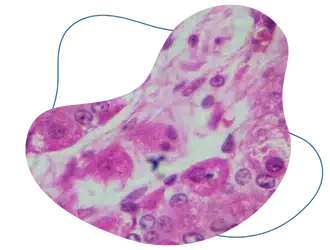Lung cancer remains one of the most common and serious types of cancer worldwide. However, significant breakthroughs in science and medicine are giving us more tools than ever before to better understand, detect, and treat this complex disease.

At Stemwell, we are committed to combining regenerative medicine with advanced genetic testing to develop personalized, safer, and more effective care. On this World Lung Cancer Day, we want to share emerging research on mesenchymal stem cells (MSCs), genomic technologies and how these approaches could help shape the future of lung cancer care.
What Are Mesenchymal Stem Cells (MSCs)?
MSCs are a type of adult stem cell capable of tissue repair and immune modulation. They also have the ability to migrate toward damaged or inflamed tissues, including tumors. However, it’s important to note that the use of MSCs in oncology is still largely in early-stage clinical research, and not yet approved for routine clinical use.
Potential Applications Under Study:
- Targeted Drug Delivery
MSCs can be engineered to transport cancer-fighting agents (e.g., chemotherapy or immunomodulators) directly to tumor sites. This targeted delivery aims to improve treatment precision and reduce systemic side effects (Kareem et al., 2025; Kolluri et al., 2013).
- Enhancing Immunotherapy
MSCs and their extracellular vesicles (EVs) are being investigated for their immunomodulatory properties, which may enhance the effectiveness of immunotherapies by promoting immune regulation and reducing inflammation (Kareem et al., 2025; Wang et al., 2022).
- Reducing Treatment-Related Damage
Radiation and chemotherapy can damage healthy lung tissue. Preliminary studies suggest MSCs may help reduce this damage and promote healing, potentially improving post-treatment quality of life (Hou et al., 2022).
- Emerging Insights: Mitochondrial Transfer
Mitochondrial transfer—where healthy mitochondria are introduced into damaged or dysfunctional cells—is a novel area of investigation in regenerative oncology. In lung cancer, Spees et al. (2006) demonstrated that mesenchymal stem cells (MSCs) can donate mitochondria to carcinoma cells in vitro, restoring their respiratory function. Although still preclinical, similar approaches in other cancers have shown potential to suppress tumor growth, enhance chemosensitivity, and support immune modulation (Chang et al., 2019; Journal of Pharmaceutical Analysis, 2025). However, recent findings also indicate that cancer cells may exploit mitochondrial transfer to impair immune responses by altering the function of tumor-infiltrating lymphocytes (Zhang et al., 2024), underscoring the need for further research to safely harness this strategy in clinical care.

Important Note on Risks
While promising, MSCs are not without risk. Some studies indicate they may inadvertently support tumor growth under certain conditions (Gu et al., 2020; Yan et al., 2021; Zakaria & Yahaya, 2020). This underscores the importance of strict regulation, rigorous testing, and ethical oversight. Many current investigations focus on engineered MSCs or EVs to control and optimize their behavior for safety and efficacy.
The Role of Genetics: From Risk to Real-time Personalization
At Stemwell, we use advanced genetic tools to personalize lung cancer care from both a preventive and treatment perspective. Our approach combines whole genome sequencing (WGS), polygenic risk scores (PRS), and liquid biopsy into a single, comprehensive strategy.
WGS analyzes nearly all of a person’s DNA to identify rare and common mutations linked to lung cancer risk, tumor behavior, and treatment response. PRS provides an overall estimate of an individual’s risk by combining the effects of many common genetic variants. Together, these tools help predict cancer risk even in non-smokers, guide early screening, and uncover hidden risks in underdiagnosed populations.
In parallel, liquid biopsy allows us to detect tumor DNA circulating in the blood; offering a real-time, non-invasive way to monitor disease progression, treatment response, or relapse.
By integrating hereditary genetic testing and liquid biopsy into one comprehensive test, we can better detect cancer early, tailor treatments, and adapt care as the disease evolves. This is how we bring precision medicine into daily practice, personalized, proactive, and always patient-centered
Looking Forward: Innovation Grounded in Safety
The integration of MSCs and genetic testing into lung cancer care remains a work in progress. However, these evolving technologies offer meaningful hope for more personalized, targeted, and less toxic approaches to prevention and treatment.
At Stemwell, we ensure all therapies follow established regulatory and ethical guidelines and are supported by the latest scientific evidence. We continue to explore these innovative tools in a controlled and compassionate environment, always prioritizing patient safety.
This World Lung Cancer Day, we celebrate progress and reaffirm our commitment to advancing care through science, ethics, and personalized medicine.
References
Dai, J., Lv, J., Zhu, M., et al. (2019). Identification of risk loci and a polygenic risk score for lung cancer: A large-scale prospective cohort study in Chinese populations. The Lancet Respiratory Medicine, 7(10), 881–891. https://doi.org/10.1016/S2213-2600(19)30144-4
Gabriel, A. A. G., Atkins, J. R., Penha, R. C. C., et al. (2022). Genetic analysis of lung cancer and the germline impact on somatic mutation burden. Journal of the National Cancer Institute, 114(8), 1159–1166. https://doi.org/10.1093/jnci/djac087
Gu, J. J., Hoj, J., Rouse, C., & Pendergast, A. M. (2020). Mesenchymal stem cells promote metastasis through activation of an ABL-MMP9 signaling axis in lung cancer cells. PloS One, 15(10), e0241423. https://doi.org/10.1371/journal.pone.0241423
Hou, G., Li, J., Liu, W., et al. (2022). Mesenchymal stem cells in radiation-induced lung injury: From mechanisms to therapeutic potential. Frontiers in Cell and Developmental Biology, 10, 1100305. https://doi.org/10.3389/fcell.2022.1100305
Hung, R. J., Warkentin, M. T., Brhane, Y., et al. (2021). Assessing lung cancer absolute risk trajectory based on a polygenic risk model. Cancer Research, 81(6), 1607–1615. https://doi.org/10.1158/0008-5472.CAN-20-1237
Kareem, R. A., Sameer, H. N., Yaseen, A., et al. (2025). A review of the immunomodulatory properties of mesenchymal stem cells and their derived extracellular vesicles in small-cell and non-small-cell lung cancer cells. International Immunopharmacology, 146, 113848. https://doi.org/10.1016/j.intimp.2024.113848
Kolluri, K. K., Laurent, G. J., & Janes, S. M. (2013). Mesenchymal stem cells as vectors for lung cancer therapy. Respiration, 85(6), 443–451. https://doi.org/10.1159/000351284
Lee, P. H., Chen, I. C., Chen, Y. M., et al. (2024). Using a polygenic risk score to improve the risk prediction of non-small cell lung cancer in Taiwan. JCO Precision Oncology, 8, e2400236. https://doi.org/10.1200/PO.24.00236
Wang, J., Ma, Y., Long, Y., & Chen, Y. (2022). Extracellular vesicle derived from mesenchymal stem cells have bidirectional effects on the development of lung cancer. Frontiers in Oncology, 12, 914832. https://doi.org/10.3389/fonc.2022.914832
Chang, J. C., Chang, H. S., Wu, Y. C., et al. (2019). Mitochondrial transplantation regulates antitumour activity, chemoresistance and mitochondrial dynamics in breast cancer. Journal of Experimental & Clinical Cancer Research, 38, Article 21. https://doi.org/10.1186/s13046-019-1028-z
Journal of Pharmaceutical Analysis. (2025). The role of mitochondria transfer in cancer biological behavior, the immune system and therapeutic resistance. Journal of Pharmaceutical Analysis, 15(3), Article 101141. https://www.sciencedirect.com/science/article/pii/S2095177924002387
Spees, J. L., Olson, S. D., Whitney, M. J., & Prockop, D. J. (2006). Mitochondrial transfer between cells can rescue aerobic respiration. Proceedings of the National Academy of Sciences of the United States of America, 103(5), 1283–1288. https://doi.org/10.1073/pnas.0510511103
Zhang, H., et al. (2024). The role of mitochondria in tumor metastasis and advances in mitochondria-targeted cancer therapy. Cancer and Metastasis Reviews. https://doi.org/10.1007/s10555-024-10211-9
Ready to learn more about stem cell therapy?

At Stemwell, our team of doctors are highly skilled in successfully supporting thousands of people with a range of stem cell treatments. If you would like to learn more about stem cell therapy you can contact us with any questions, or apply today to check your eligibility.

